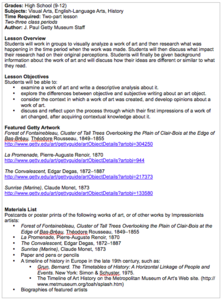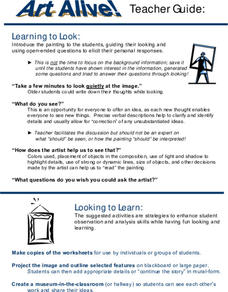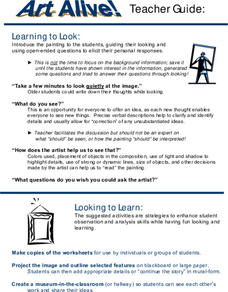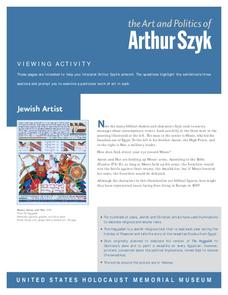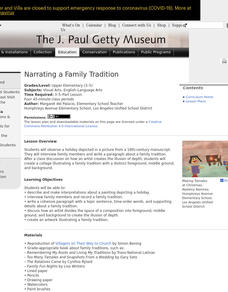Curated OER
Art: Drawing Ducks in Their Natural Habitats
Sixth graders explore various waterfowl species and discover how duck stamps are used. After researching specific types of birds for a stamp competition, they draw the birds in various natural settings. Before sending the submissions,...
Curated OER
Working in your Cubicle: Critical Thinking and Writing
Explore informative and explanatory writing with this lesson. Using a cube labeled with directives to describe, analyze, compare, associate, apply, and argue the topic, middle schoolers work individually or in groups to answer questions....
Brigham Young University
Problems? Working it Out
Working in pairs, set designers take turns sharing their sketches, explaining how their renderings articulate their concept, and receiving feedback on concerns and questions.
Curated OER
Differentiated Language Arts
Pupils read speeches and identify the main idea as well as the literary techniques employed, paying careful attention to the persuasion and repetition elements that each speech possesses. Using a graphic organizer, they analyze,...
Curated OER
Pop-Art Heart Card
Students recognize the work of important 20th-century artists such as Andy Warhol, Roy Lichtenstein, and Keith Haring. They explore the differences between realistic and abstract art forms. Afterwards, they create a piece of abstract art...
Curated OER
Note Cards
This is a very simple idea, learners make note cards or stationery out of their recycled art work. Note: I have done a version of this, where I've had my special needs learners paint on card stock or watercolor paper. I then cut each...
J. Paul Getty Trust
Historical Context: Discovering a Painting
Class members are presented with the image of a painting and asked to record their first impressions and analysis. They then research the time period in which it was painted and discuss how their research impacted their first impression...
Project Articulate
Textured Landscapes with Grant Wood
Explore the world of textured landscapes through the eyes of the famous artist, Grant Wood. Here is an elementary art lesson in which scholars learn about Grant Wood's life, view his work, draw their own textured landscape, and then...
J. Paul Getty Trust
Shaping Ideas: Symbolism in Sculpture—Lesson 2
Young artists create a series of sketches of ideas for a sculpture, and using the criteria develop in the previous class, critique their sketches. They then choose one of their ideas and create their work of art.
Dick Blick Art Materials
Chenille Stem Stitchery
The works of Spanish painter Joan Miro are used to inspire young artists to create their own colorful works of art using stitchery canvas and yarn. Kids draw their design on plastic canvas using erasable crayons and then stitch the...
Dick Blick Art Materials
Torn Metal Collage
The work of Austrian artist Gustav Klimt is used to inspire kids to create their own mixed media works. Although designed for the special education classroom, the activity is sure to inspire all kids.
The New York Times
Literary Pilgrimages: Exploring the Role of Place in Writers’ Lives and Work
Do the places you have lived influence what you write? Class members research the lives of writers and look for how places these writers have lived might have influenced their writings.
National Gallery of Canada
Memories of the Past
Explore contemporary American Indian art. After viewing a set of images, class members discuss the design elements of techniques present, as well as how these artists represent history and culture. Learners examine the parfleche and...
Dick Blick Art Materials
EZ-Grout Mosaics
Young artists create 2-D art using air-dry clay and acrylic paint in this mosaic-making activity. Kids trace their design sketch on a clay slab, cut out the pieces, and after drying, paint and mount their tile design.
Memorial Art Gallery
Art Alive! - Towing a Boat, Honfleur
Color, light and shadow, the placement and size of objects. These are some of the tools artists used to tell their stories. Model for learners how to read a painting by closely examining these features. The richly detailed packet...
Memorial Art Gallery
Art Alive! - Beach at Blue Point
And then what happened? Class members engage in a series of activities that model for them how to read the story in a painting. Participants respond to questions that ask them to closely examine the elements in William Glackens' "Beach...
US Holocaust Museum
The Art and Politics of Arthur Szyk
Have you ever listened to a song that had a deeper political meaning to it? Every examined a work of art with layers of meaning? Pupils analyze the drawings of Arthur Szyk. They research the deeper meaning of several artistic cartoons...
National Museum of the American Indian
Fritz Scholder: A Study Guide
In this engaging activity involving close analysis of abstract expressionist art, your class members will not only discover more about artist Friz Scholder's Native American art, but they will also have the opportunity to consider...
Dick Blick Art Materials
“Gawu” — African-influenced Tapestry
Here's a great way to combine environmental science with art. Kids use recycled materials to create their own Gawu, a tapestry made of discards. Although designed for special education classrooms, the activity is sure to engage all...
J. Paul Getty Trust
Narrating a Family Tradition
After examining a piece of art, scholars discuss what they see, paying close attention to details and space. A read-aloud introduces the topic of family traditions. Pupils interview their family members about a tradition in preparation...
Dick Blick Art Materials
Glue Paint Symmetry Prints
Add watercolors to white glue, paint onto clear film paper, fold, open, and voila, a butterfly! This art project, designed for special education classes, but perfect for any classroom, is sure to engage your young artists.
EngageNY
Scaffolding for Essay: Planning Body Paragraphs for Position Paper This work is licensed under a Creative Commons Attribution-NonCom
Scholars begin creating a plan for their position papers using a Sustainable Water Management Position Paper Planner. They talk with partners about their claims and counterclaims for the essays. Writers then work independently to plan...
EngageNY
Building Vocabulary: Working with Words about the Key Elements of Mythology
Build vocabulary one word at a time. Scholars work to create word models to describe the key elements of myths. After viewing and discussing glossaries, they begin working in triads on their models that include the word, synonyms,...
Facing History and Ourselves
Literature and Imagination Make Democracy Work
The final instructional activity in the "What Makes Democracy Work?" series examines the connections between imagination, literature, and democracy. Class members listen to a podcast, read an excerpt from Azar Nafisi's, The Republic of...
Other popular searches
- Aboriginal Art Worksheets
- Art History Worksheet
- Elements of Art Worksheets
- Renaissance Art Worksheets
- Middle Ages Art Worksheets
- Modern Art Worksheets
- Analyzing Works of Art
- Art Worksheets
- Social Studies Art Work
- Christmas Art Worksheets
- Works of Art
- Slavery Art Work








